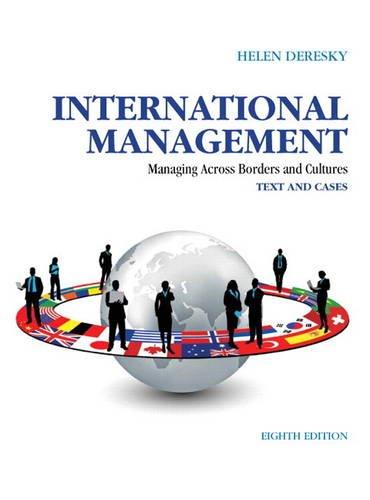The above statements truly reflect HSBC Holdings (hereafter HSBC) massive and distinct operations in 2012 that maintained
Question:
The above statements truly reflect HSBC Holdings’ (hereafter HSBC) massive and distinct operations in 2012 that maintained 89 million customers worldwide. Originally known as Hong Kong Shanghai Banking Corp., the bank was founded in Hong Kong and Shanghai in 1865. Currently based in London, UK, HSBC is a well-known global entity (with two nationalities), has 7,200 offices in 80 countries, and employs 295,000 workers worldwide. In emerging markets, HSBC continues to be a visible player and has expanded because of tangible consumer demand and growth opportunities.
In 2011, HSBC had revenues of $105.80 billion and made a pretax profit of $21.95 billion. The bank’s total assets stood at $2.55 trillion. As of 2012, HSBC’s operations are in most major parts of the world. The bank’s main revenues come from commercial banking, global banking, retail banking and wealth management, and private banking. HSBC did lose money during the 2008 global financial crisis. At the same time, the bank did not seek any bailout in Europe and Asia and continues to be a visible brand in the global banking industry. No wonder HSBC’s distinct slogan (“The world’s local bank”) reflects its strong corporate identity and global networks.
The global banking industry is a major strategic industry in world business, impacting countries, industries, and firms alike. Historically the industry’s growth has been based on region- and country-specific strategies because of national developmental agendas and ideologies. Banks may be global in their operations but mostly thrive because of national identities, networks, and financial resources.
In July 2011, HSBC was rated the third largest bank in its tier one capital ($163 billion). Other top banks in the list included Bank of America, JPMorgan, CitiGroup, Mitsubishi UFJ Financial Group, Industrial Commercial Bank (China), and Wells Fargo. The top 25 banks originated from the U.S., the UK, Japan, China, Japan, France, Italy, and the Netherlands. The pace of change and competition in the global banking industry is highly dynamic and fierce. The 2008 global financial crisis created havoc in the banking industry. During the crisis, banks’ and financial institutions’ “systematic distress” and “spillover effects” created major problems for the industry. HSBC was also impacted by the crisis and ended up losing money and customers. Unlike American banks, HSBC’s operations were somewhat spared but growth remained stagnant during this period. The bank closed its money-losing operations and sold a few assets. This was a major disruption in HSBC’s history and weakened the bank’s well established business model.
To deal with the 2008 financial crisis, HSBC embarked on a major reorganization that changed its strategy and growth patterns. In 2011, HSBC trimmed its North American operations because of losses in the area of subprime lending. At the same time, HSBC started expanding in emerging markets of Asia. China was selected to be the bank’s major market for future growth. Other reorganization took place that aimed at mostly downsizing and trimming operations. These changes did impact the bank’s massive operations in global markets.
Questions
1. How do you evaluate HSBC’s global reorganization and expansion in the post–financial crisis period?
2. Compare and contrast HSBC’s global operations with its main competitors.
3. What did you learn from the HSBC’s case when applying concepts and theories?
Step by Step Answer:

International Management Managing Across Borders And Cultures Text And Cases
ISBN: 9780133062120
8th Edition
Authors: Helen Deresky





